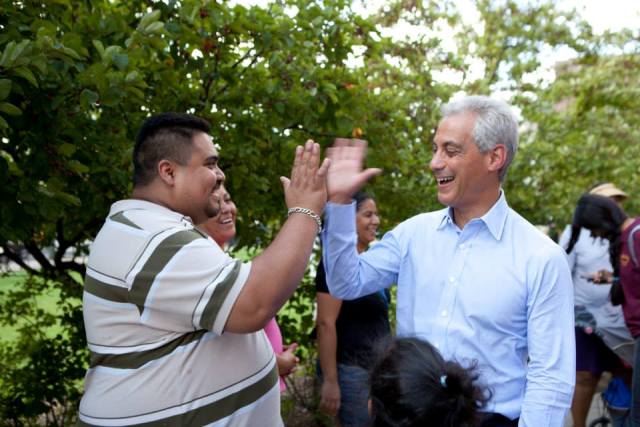Emanuel Signs Executive Order Raising Minimum Wage For City Contractors' Employees
By Chuck Sudo in News on Sep 3, 2014 6:00PM

© 2014 City of Chicago/Brooke Collins
Mayor Emanuel signed an executive order Wednesday requiring contractors and subcontractors doing business with the city to pay their employees a $13 minimum hourly wage. The order will apply only to contracts advertised by the city after Oct. 1 and will affect 1,000 employees, mainly landscapers, maintenance workers, security officers, concessionaires and in custodial services.
Emanuel’s signing of the order is another sign that Democrats will make hiking the minimum wage an issue in the November election and follows the mayor’s previous statements supporting a minimum wage increase from the state’s current $8.25 an hour. Earlier this year, President Barack Obama signed an order to boost the minimum wage of federal contractors to $10.10 an hour starting next year. Illinois Gov. Pat Quinn has championed a raise in the state’s minimum wage to $10, while advocates of a $15 minimum wage are planning another round of strikes and civil disobedience across the country Thursday.
The employees to be affected by this order already make a minimum wage of at least $11.53 an hour, and that wage is adjusted annually based on federal poverty guidelines. “With this Executive action,” Emanuel said, “we’ll help ensure that nobody who is contracted to do work with the City of Chicago will ever have to raise their children in poverty.”
Ald. Will Burns (4th), co-chair of the Minimum Wage Working Group, said, “The City can lead by example by ensuring that our contractors are paying a higher minimum wage to employees that work on City projects. This order represents another step towards our goal of a $13 minimum wage for Chicago workers, which will boost the incomes for 400,000 workers and lift 80,000 residents out of poverty.”
John Bouman, president of the Sargent Shriver National Center on Poverty Law and the Minimum Wage Working Group’s other co-chair, praised the signing and said, “A strong minimum wage makes work a path out of poverty and stimulates the economy here and throughout the state.”